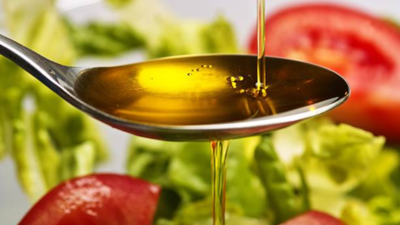Table of Contents
We all have heard that oil is “bad.” Too much oil clogs your arteries. It leads to weight gain. It’s full of calories. And while all of that might hold some truth—there’s more to this narration. Before you banish that bottle of mustard oil or throw out the ghee your grandmother swears by, let’s look at what actually happens when you cut oil from your diet—and whether that’s a smart move or not.
Let’s understand what does oil even do for us
Oil isn’t just fat. It’s concentrated fat. And our body needs fat. Yes, even if you’re trying to lose weight.
Healthy fats help absorb fat-soluble vitamins like A, D, E, and K, play a role in hormone production, keep your skin supple and your brain sharp, and provide energy—especially for people on low-carb or active diets. Not all oils are created equal, though. There’s a world of difference between cold-pressed olive oil and heavily refined palm oil.

Now, let’s imagine you go completely oil-free. No cooking oils, no dressings, nothing fried, not even a drizzle of ghee on your roti. What happens? “Cutting out all oils from the diet for two weeks can lead to several short-term effects on digestion and metabolism. Oils provide essential fatty acids that absorb fat-soluble vitamins (A, D, E, K). Their absence may impair nutrient absorption, potentially leading to deficiencies and digestive discomfort such as bloating or constipation due to altered gut motility,” dietitian Kanikka Malhotra told Indian Express.
You may drop a few kilos initially
The first thing most people notice when they stop using oil is weight loss. Why? Oil is calorie dense. As per reports, one tablespoon of oil is equal to approximately 120 calories and that adds up quickly if you’re sautéing, frying, or dressing salads regularly.
Cutting it out trims your overall calorie intake, and this might lead to a few kilos shedding off—especially if you were previously using oil liberally. But weight loss isn’t always fat loss. You might also be losing water weight or muscle mass if you’re not eating balanced meals.
Your food might feel bland and unsatisfying
Oil makes food taste good. It enhances texture, aroma, and that satisfying feeling you get after eating a warm, home-cooked meal. Without oil, food can feel dry or incomplete. You might end up eating larger portions of carbs to feel full, which may backfire over time.
The trick, if you are going oil-free, is to learn how to cook without compromising on taste—use spices, slow cooking, roasting, and healthy fats from whole foods like nuts, seeds, or avocados.
You risk missing out on fat-soluble vitamins
When you stop eating oil, your ability to absorb certain vitamins may take a hit. Vitamins A, D, E, and K need fat to be absorbed properly. No fat might lead to poor absorption and lead to potential deficiencies over time.
For example, if you are munching on a raw carrot salad without any dressing or oil, your body may not be able to extract the beta-carotene (vitamin A precursor) efficiently.
Your hormone levels might take a dip
Fats play a huge role in hormone production—especially sex hormones like estrogen and testosterone. Going completely fat-free or extremely low-fat for extended periods can cause hormonal imbalances, irregular periods in women, or even low libido in men. This is especially crucial for women over 35 or those with thyroid issues. Your body needs good fats to keep hormones stable.
You may feel hungrier, more often
Fat is satiating. It keeps you full longer. That’s why adding a spoon of peanut butter or a drizzle of olive oil to your salad makes it more satisfying.
Without fats, your meals may leave you hungry again in an hour or two. You may find yourself snacking more or reaching for high-carb, low-fat options that can spike your blood sugar.
Skin and hair may lose their glow
This isn’t an overnight change, but over time, not getting enough essential fatty acids can reflect on your skin and hair. You may notice:
- Dry, flaky skin
- Brittle nails
- Dull hair or increased hair fall
- Omega-3 and omega-6 fatty acids are found in oils like flaxseed, mustard, or even fish oil (if you’re non-vegetarian). So if you’re off oil, make sure you’re getting these from other sources.
Are there any benefits of cutting oil?
Absolutely—if you are doing it smartly.
If you’re someone with a heart condition, cutting back on saturated and trans fats (often found in fried foods and refined oils) can reduce your risk.
People with PCOS, insulin resistance, or obesity may benefit from a lower oil diet to manage weight and hormonal issues.
For those with fatty liver or gallbladder issues, reducing oil can ease symptoms.
But again, cutting back is different from cutting out. A totally oil-free diet isn’t automatically healthy unless it’s well-planned and includes other healthy fat sources.
Here’s a middle ground that actually works
Use less oil, not no oil. Stick to 2–3 teaspoons of oil per day per person. Measure it if you need to.
Switch to cold-pressed or kachi ghani oils like mustard, coconut, olive, sesame or groundnut—depending on your cuisine and climate.
Say no to refined oils and trans fats
Get fats from whole foods—avocados, nuts, seeds, coconut, olives.
Oil can absolutely be a part of a healthy lifestyle—if you pick the right type, the right amount, and balance it with the rest of your diet. You don’t have to eat greasy pakoras every day, but there’s no need to feel guilty for enjoying a bit of mustard oil in your saag either.


